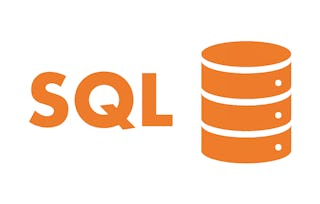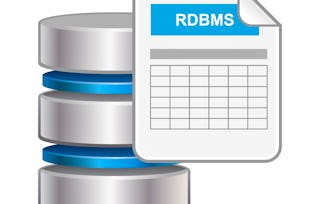Master the art of relational databases with this comprehensive course, designed to equip you with essential skills for database modeling, design, and implementation. You’ll start with core concepts like Entity-Relationship (ER) modeling, progressing through relational algebra and foundational SQL commands for creating, manipulating, and querying databases.

Relational Databases

Empfohlene Erfahrung
Was Sie lernen werden
Design comprehensive database schemas using ER modeling and normalization, transform conceptual models into efficient relational structures.
Execute complex SQL operations for data manipulation and querying, master DDL and DML statements to manage database content effectively.
Implement transaction processing and concurrency control mechanisms, apply indexing and optimization techniques for high-performance systems.
Kompetenzen, die Sie erwerben
- Kategorie: Information Technology
- Kategorie: Data Integrity
- Kategorie: Database Management Systems
- Kategorie: Query Languages
- Kategorie: SQL
- Kategorie: Information Architecture
- Kategorie: Logical Reasoning
- Kategorie: Data Modeling
- Kategorie: Database Architecture and Administration
- Kategorie: Relational Databases
- Kategorie: Transaction Processing
- Kategorie: Database Systems
- Kategorie: Database Design
- Kategorie: Data Analysis
- Kategorie: System Design and Implementation
- Kategorie: Data Management
- Kategorie: Database Management
- Kategorie: Problem Solving
- Kategorie: Database Theory
- Kategorie: Databases
- Der Fähigkeiten-Abschnitt ist eingeklappt. 9 von 20 Fähigkeiten werden angezeigt.
Wichtige Details

Zu Ihrem LinkedIn-Profil hinzufügen
November 2025
Erfahren Sie, wie Mitarbeiter führender Unternehmen gefragte Kompetenzen erwerben.

In diesem Kurs gibt es 10 Module
All Information Systems operate on data. Most of the systems depend on Database Management Systems, commonly referred as DBMS, to store the data and enable updates and retrievals. Modern DBMS have rich functionality to maintain and protect data during concurrent access from users. We look at expectations from DBMS to meet the needs of organizations. We will finally look at varieties of DBMS that are available.
Das ist alles enthalten
13 Videos10 Lektüren5 Aufgaben
In this module, we discuss the basic concepts of conceptual database design. We understand anomalies in database operations. You will be introduced to the Entity–Relationship (ER) model, which is a popular high-level conceptual data model. We will discuss the diagrammatic notations used with the ER model, the ER model's constraints, and their use in the design of conceptual schemas for database applications. We also understand the basics of the Enhanced Entity–Relationship (EER) Model.
Das ist alles enthalten
13 Videos13 Lektüren6 Aufgaben
In this module, we discuss the basic concepts of Relational Model. We understand the Relational Model Terminologies. We discuss the characteristics of Relations and the Relational constraints. We also learn and understand the update Operations and the ways to deal with Constraint Violations. We learn the steps and process of mapping ER Constructs to relations.
Das ist alles enthalten
17 Videos17 Lektüren7 Aufgaben
In this module, we will learn formal query languages associated with the relational model. We will look at query operators in these languages and see how we can combine the operators to get the desired results.
Das ist alles enthalten
13 Videos13 Lektüren6 Aufgaben
In this module, we will learn Structured Query Language(SQL), which is a standard-based language implemented by all relational databases to enable working with the structure and contents of the database . We will look at statements for defining schema, querying, and updating data in the database.
Das ist alles enthalten
17 Videos17 Lektüren7 Aufgaben
In this module, we discuss the basic concepts of Functional dependencies and inference rules. We understand anomalies in database operations. We understand the need for normalization of relational schemas. We discuss the conditions for various Normal Forms- 2NF, 3NF, and BCNF. We explore the process of decomposition used to take a relation to higher normal forms. We learn how to check whether a decomposition is lossless or dependency-preserving.
Das ist alles enthalten
10 Videos8 Lektüren5 Aufgaben
In this module, you will understand important disk properties and how data is stored on the disk. You learn about the File storage schemes for storing data. You learn important static hashing and dynamic hashing schemes used for storing and fast retrieval of data from the database
Das ist alles enthalten
10 Videos9 Lektüren5 Aufgaben
In this module, you will understand what is Indexing and its purpose in Databases. You will gain knowledge about the various categories of Indexing schemes like- Primary indexing, Secondary indexing and Multilevel indexing, and also learn how to design the same. You will understand and learn to design B+ tree indexing structures for Relational databases.
Das ist alles enthalten
10 Videos10 Lektüren7 Aufgaben
In this module, you learn about the Transaction model used in relational database systems which includes the need for a transaction, concept of schedule, serial and concurrent schedules, and serializability. You learn the need for concurrency control and the concept of locks-based concurrency control, deadlock and deadlock detection. You also learn about Timestamp-based protocols for concurrency control.
Das ist alles enthalten
11 Videos10 Lektüren5 Aufgaben
In this module, first, you learn various schemes to recover from loss in the event of a crash, and restoring the databases with minimum impact. You learn more on log-based recovery techniques including checkpointing. Then, you understand the steps in SQL query processing and you are introduced to Query optimisation and Heuristics used. Next, you will get an introduction to Database security and important schemes used in securing databases from unauthorised access.
Das ist alles enthalten
11 Videos12 Lektüren6 Aufgaben
Dozent

Mehr von Software Development entdecken
 Status: Kostenloser Testzeitraum
Status: Kostenloser Testzeitraum Status: Kostenloser Testzeitraum
Status: Kostenloser TestzeitraumIllinois Tech
 Status: Vorschau
Status: VorschauUniversitat Politècnica de València
 Status: Kostenloser Testzeitraum
Status: Kostenloser Testzeitraum
Warum entscheiden sich Menschen für Coursera für ihre Karriere?

Felipe M.

Jennifer J.

Larry W.

Chaitanya A.

Neue Karrieremöglichkeiten mit Coursera Plus
Unbegrenzter Zugang zu 10,000+ Weltklasse-Kursen, praktischen Projekten und berufsqualifizierenden Zertifikatsprogrammen - alles in Ihrem Abonnement enthalten
Bringen Sie Ihre Karriere mit einem Online-Abschluss voran.
Erwerben Sie einen Abschluss von erstklassigen Universitäten – 100 % online
Schließen Sie sich mehr als 3.400 Unternehmen in aller Welt an, die sich für Coursera for Business entschieden haben.
Schulen Sie Ihre Mitarbeiter*innen, um sich in der digitalen Wirtschaft zu behaupten.
Häufig gestellte Fragen
To access the course materials, assignments and to earn a Certificate, you will need to purchase the Certificate experience when you enroll in a course. You can try a Free Trial instead, or apply for Financial Aid. The course may offer 'Full Course, No Certificate' instead. This option lets you see all course materials, submit required assessments, and get a final grade. This also means that you will not be able to purchase a Certificate experience.
When you enroll in the course, you get access to all of the courses in the Specialization, and you earn a certificate when you complete the work. Your electronic Certificate will be added to your Accomplishments page - from there, you can print your Certificate or add it to your LinkedIn profile.
Yes. In select learning programs, you can apply for financial aid or a scholarship if you can’t afford the enrollment fee. If fin aid or scholarship is available for your learning program selection, you’ll find a link to apply on the description page.
Weitere Fragen
Finanzielle Unterstützung verfügbar,
¹ Einige Aufgaben in diesem Kurs werden mit AI bewertet. Für diese Aufgaben werden Ihre Daten in Übereinstimmung mit Datenschutzhinweis von Courseraverwendet.

